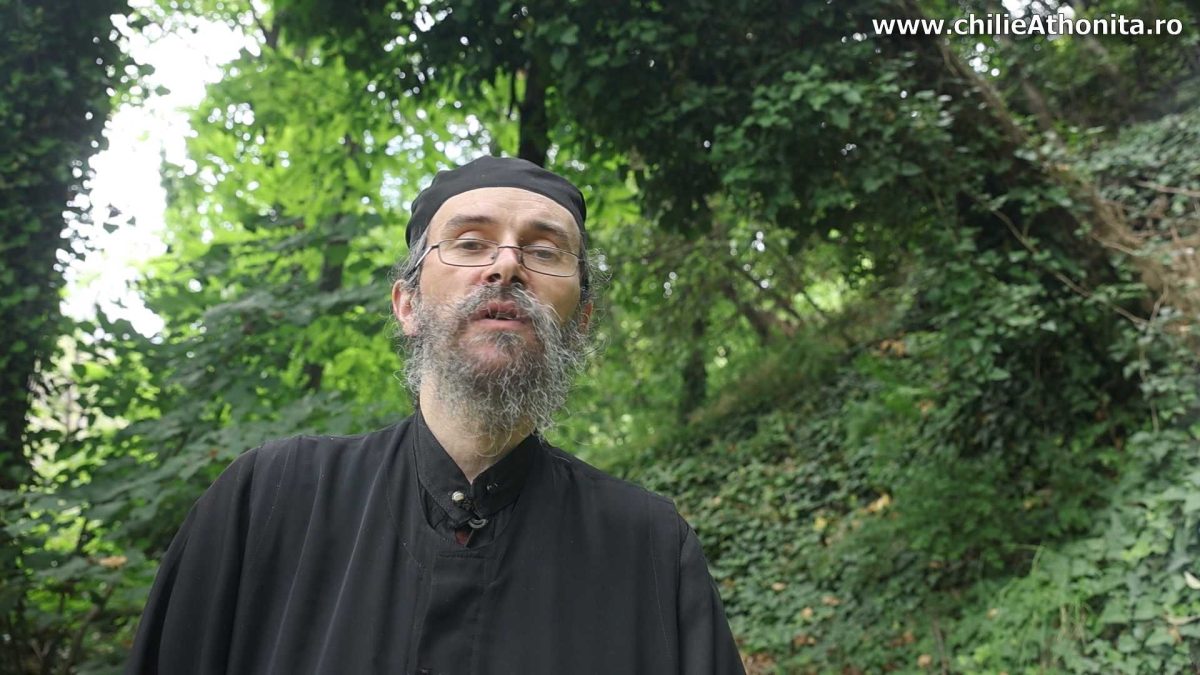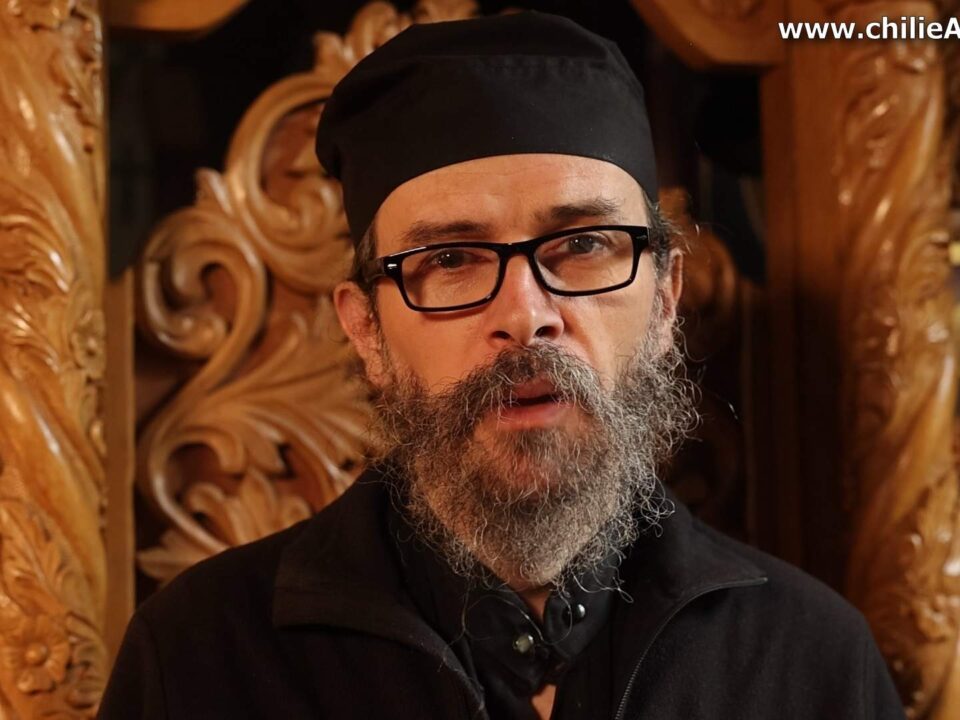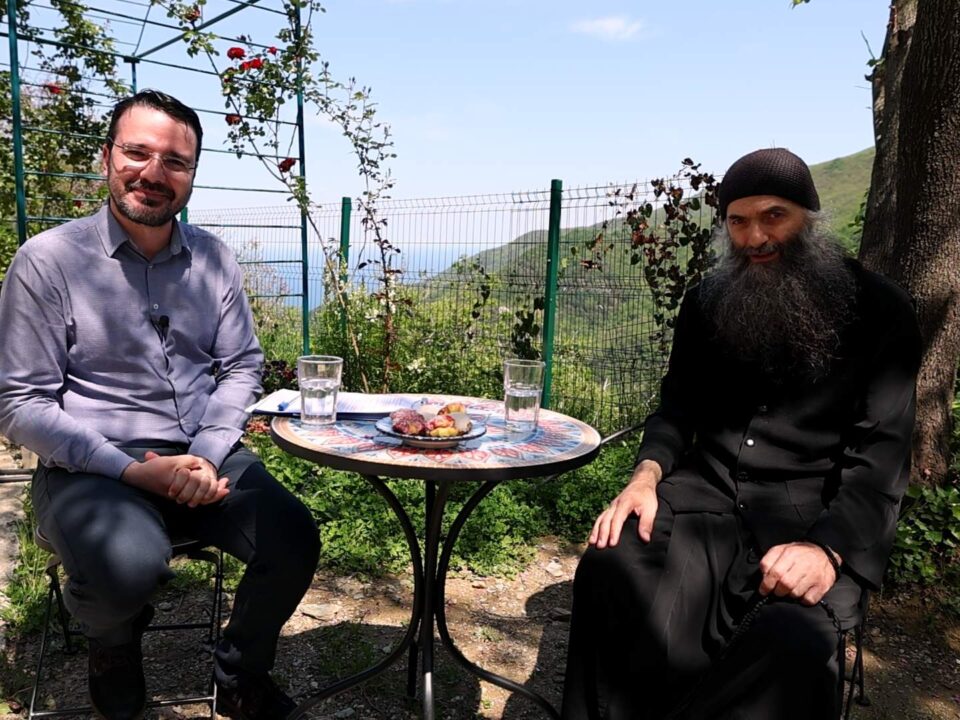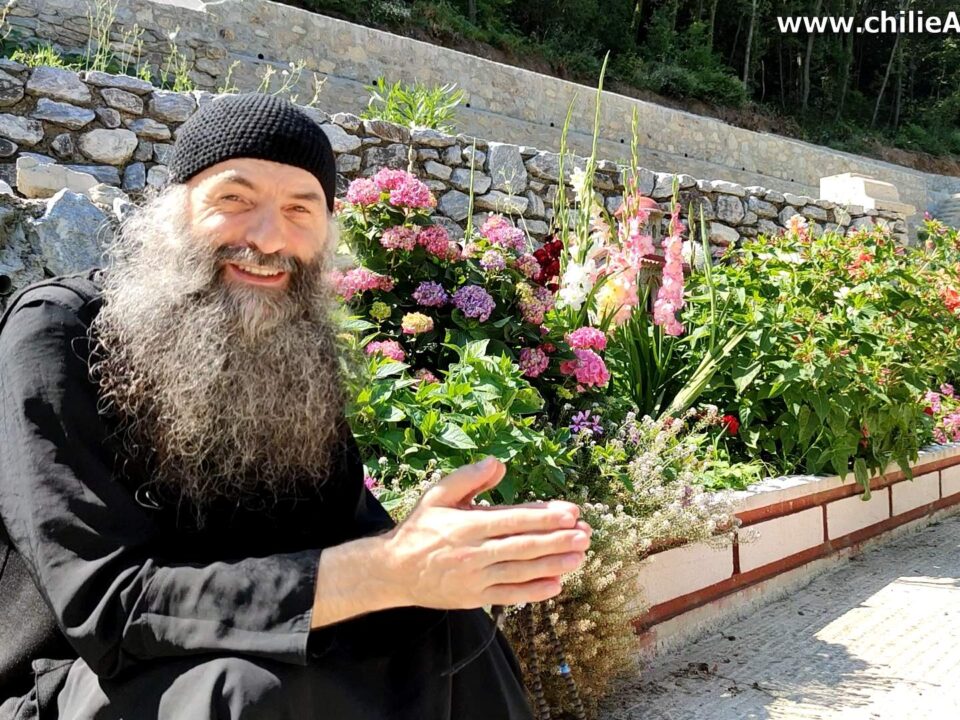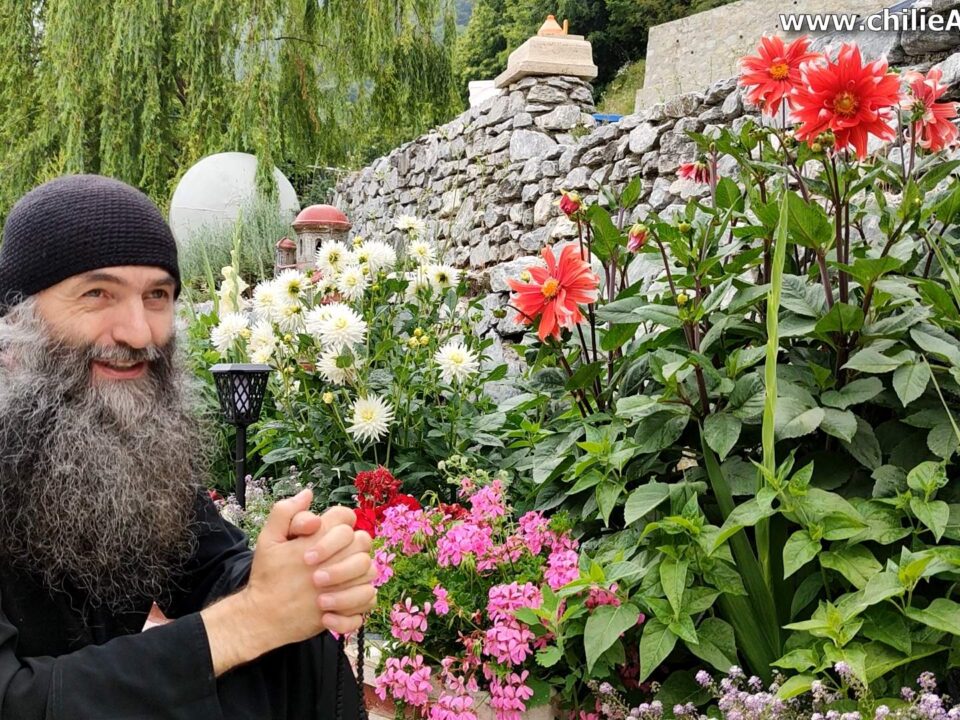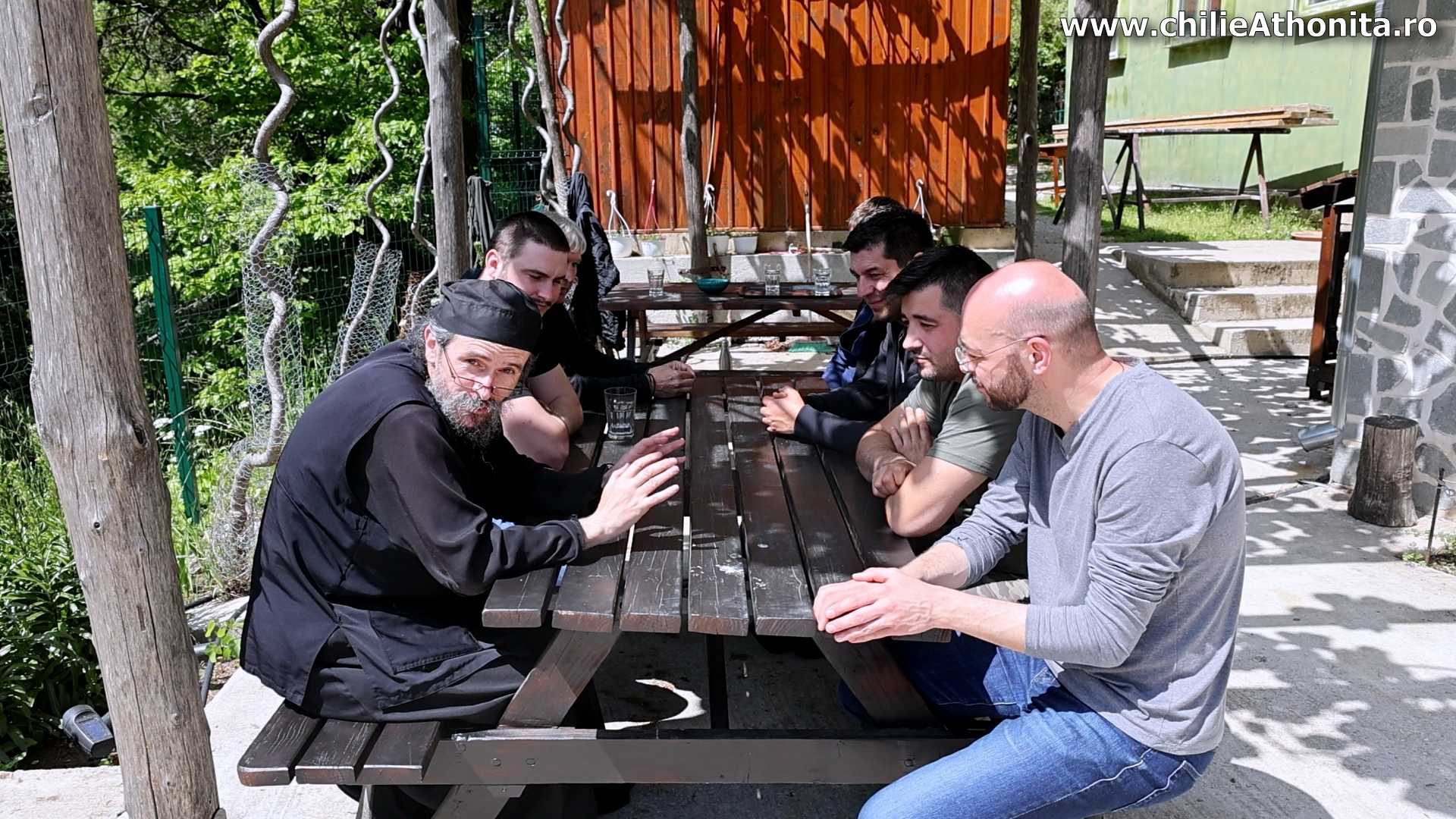
Three Miracles of the Mother of God: Austria, Toronto, the Holy Mountain
4 June 2022
Our Cell: Trials and Tribulations; Sweet Rewards – Father Pimen Vlad
9 June 2022As we see today, the problems of young people generate great dramas, dramas that can mark for a lifetime not only the young person who suffers from them but also those around them.
What are these problems? Where do they come from? How are they treated?
Watch this video to find out.
Enjoy!
Glory to the Father, and to the Son, and to the Holy Spirit, now and forever and unto the ages of ages. Amen!
Through the prayers of our Holy Fathers, Lord Jesus Christ, Son of God, have mercy on us! Amen!
Today, we’re going to talk a little bit about the problems of young people, the problems of raising children and how a child should be raised so that they don’t have the great problems that someone has in their teens.
First of all, the first thing we need to know is that today there is a rather harmful way of thinking, you should know; it’s the thinking that families try to have as few children as possible, if possible, only one son, only one child. They say this in order to live their lives, to live well, and to not have worries. Brethren, this is wrong, you should know, because the Church says that families with many children are blessed. And why is that? Because there are some very strong psychological phenomena at work, you should know!
When there is only one child, then that child has problems with loneliness, with egotism, with all these things, and then an only child is very difficult to raise because all the care of the parents falls on him and he will continually learn, if the parents are not careful, to ask for things. And then the parents will continually have to take care of him.
If there are two siblings, things are already much better, but then rivalry arises between the two and many times one complains about why the other has five grams more sweets and why the other’s ice cream is bigger and why the other should be first instead of them, and all these things.
From 3 [children] and up, things are already very good and the kids are actually starting to raise each other. Especially the oldest one tries – and especially if she is a girl – she tries to raise the younger one together with the middle one. And if the parents give them responsibilities, then even more so.
From four [children] and upwards, things are very, very good. Because of this, brethren, you should know that the Church has said that families with many children are blessed. Because children mature and begin to grow up on their own. And let me tell you a case about that as well.
At one point, at the monastery I was at, there were a lot of restorers and they were in charge of restoring a mosaic and there were a few of them, they were talking amongst themselves and at one point one of them complained.
And he says, “I have big problems with my child.”
And one of the other restorers says, “Well, how many children do you have?”
And the complaining restorer says: “One child.”
And the one who asked him answers, “Well, you see, it’s because of that, because you only have one child; I have four and I have no problems.”
Likewise, the third restorer who was also present working there, said, “Yes, so it is, I have five children and for me everything is very, very good.”
Because from three children and up, parents turn from child raisers to child supervisors, and as I said, children begin to grow on their own.
Now, when they are young, up to the age of 15, children should be counseled a lot and taken to church. We have to take care of them and be close to them and not leave them with tablets and leave them to their own devices because we will pay for that. Adolescence is actually the exam where we’re going to see how we raised our children. And because of that, when they are small, – and not only then, but especially then – we have to pray for them and pray with them, you know. Because we have to pray together with the children and not have separate lives. Of course, mature people have other problems that children do not need to know, but nevertheless, there should not be separate lives. Let there be no distance between you!
Because the child must know that at all times he can address the parent without repression. Because of this it is very important that the personal example of the parent is evident and for this we must have a spiritual measure ourselves. If we are an example, then we can ask the little one to obey. Otherwise they’ll say, “Alright, but why should I listen to you?” Do you understand?
But if we give a personal example, and, first of all, we give them our time, our attention, without which we will not succeed as parents, you should know, if we give them our time then we will be able to make them listen. If we don’t give them time, they’re not going to listen to us because ultimately they’re going to see us as a stranger or they are going to listen out of fear, at most. Fear of repercussions, and this is going to generate great traumas that will be very hard to heal, if they heal.
Now, how do we teach them obedience? By awarding it. So the moment they come to ask you something, in that moment we say: “Normally, I would not have given you that thing, but because you asked me, I’ll give it to you.” Or, “Because you asked me, I will allow it. I wouldn’t have let you, but because you asked me, I’ll let you do this!”
Or at some point you’ll see that they’re doing something without asking for permission and you’re going to say, “Why didn’t you ask for my permission? You know that if you had asked me for permission, I would have allowed it. You know that if you had asked me for permission, I would have let you.”
So this is very important to emphasize, that more than what they ask of us, the child’s dependence on us is more important, beyond the thing itself. Which of course, we often have to be very permissive with them to teach them to be dependent. Of course, we will not do everything they want. And especially, it is very harmful to ask children,
“What do you want me to do for you?”
We shouldn’t potentiate their will. They should do what we want, as we have life experience, and not what they want. Of course we must know what they want and not make them become inhibited, but always make it very clear to them that we are going to have the last word and for that we must set this personal example, to offer them love and love is given through our time and attention.
Beyond the learning of obedience and dependence on us, we must teach the child a schedule. That is, to have a schedule. Because of this we can say to them the following, of course, this is when they grow up:
“What time are you going to come tonight? At 10 at night, at 11 at night, at 12 at night, what time are you going to come?”
And they’re going to say a certain hour. Alright, then we’ll see what time they come back. So if they said they’re coming back at 11 o’clock and they come at 11:20, we’re going to tell them, “Why did you come at 11:20? You know that if you had asked to come back at 12, I would have let you. Why did you come at 11:20?”
In this way to clearly show them that it’s not the fact that they came in at 11:20pm that matters that much, but the fact that they went over the schedule, that they are not restrained, that they are not attentive. Because if we don’t teach the child to be attentive, to be mature, to be responsible, then they will be un-restrained, and when he grows up, God forbid, he will be debauched. May the Good God forbid it! Do you understand? [That is] because the adolescence that they’re going to enter after the age of 15-16 and so on, has a very big emotional charge. The young person takes flight and then with great difficulty they will listen to us. And because of this they must be taught from a young age to be attentive, to be responsible, of course, not out of hatred, not out of pressure, but because of guidance, because of a loving teaching.
And for this, as I said, until adolescence, they must taste Christ, that is, they must go to church, confess. To confess even from very early ages, from 5 years old. Brethren, not because at 5 years old the child has something to confess, let’s be serious. But from the age of 5-6, to learn the necessity of confession, to learn to confess, do you understand?
And the moment they get to taste Christ in their childhood, they will return at the end of their adolescence, when they stabilize. And if they have this pre-formed need to confess, the child will be dependent, including in this very critical period of adolescence in which they transform both physically and mentally a lot, and become the person, the man/woman that they’re going to become.
But due to the fact that now there are many changes happening, very quickly in this period of adolescence, the youth is much more fragile, much more agitated, insecure, reckless, does not have a sense of danger, they do not know because they have no experience.
A lot of things are happening to them and their brain, their mind, can’t process all these changes that they’re going through. They panic. Because of this, we have to talk to our children, as I said, to give them time and spiritual support, meaning, to give them love, brethren!
On the other hand, you need to know that, in general, children are afraid to talk to their parents because they are not understood, or they will suffer consequences, or they are embarrassed, or because they lose the acceptance of their parents. There are a lot of factors, a lot of causes why children get inhibited. Why? Because parents often scold them without discernment. And so the tension remains, or maybe even increases, and this great conflict of generations arises.
Then if the parents do not always act with gentleness… even when we scold the child we must do so gently, we say to him, “You know, regarding that thing, I think it would be better if it was like that. Please, do so!”
The child should always know that I am with them against the problem. I have said this many times, it’s not me against the child with their problem or me with my problems against the child. Rather, let’s always try to solve problems together, right? As the problems are outside of us and it’s not the problems that separate us.
Because, if not, children take refuge, they close up inside themselves. They usually take refuge in art, you should know, in music, in parties, in the circle of friends. It’s very important what circle of friends they have and so they close themselves in this universe of theirs, with their idols. In their heaven… “their heaven” of course, quote unquote. So it’s not like it is here around me where it really is very nice. Well, and in this pseudo-heaven in which they find themselves, the great vices can appear: drinking, drugs and so on. Cigarettes, God forbid! And other bodily sins and all that, God forbid!
The adolescent, however, must understand that bodily pleasure is a chimera, it is the effect of a chemical reaction, it is an increase in a chemical substance, of some neuro-transmitters, of some enzymes, of which the best known, but not the most important, is dopamine. This is very well known, I wouldn’t want to get into chemistry topics, because it is not the subject of our discussion.
In any case, what is very important here, as I was saying, is that bodily pleasure is the result of a chemical reaction. And no chemical reaction can fulfill the person. Only another person can fulfill another person. That is true and the young person feels this and here arises the great problem of inexperience in discerning what love for another person is, in fact. So how do we choose a good partner? How do we love?
Because in adolescence this very strong love appears, this explosion of sentimentalism, based on the senses and not based on spiritual knowledge and because of this young people make huge mistakes, if they are not careful and if they do not have the spiritual knowledge, and do not have the support of their parents and of the spiritual father.
Of course, for this parents need to prepare, they need to be careful so that they have a very good relationship with the child so that, as I said, the children do not close up inside themselves. And besides that, even the parents do not know what the guidelines are to tell the child so that they can choose a life partner.
Because yes, children really should not have sentimental relationships until the moment they get married, but unfortunately, we have to be realistic and accept that practically reality is a little different and today also because of the pressures of society, teenagers are very, very liable to find a partner. Most of them have this thing. And on top of that, their age also demands it, and besides that they can’t start a family because our society is built like this today, so they have a lot to learn, universities, master programs and all that stuff.
In the past, you know very well, that people were getting married at the age of 18, they had a family, they had children, they had a house to keep. Brethren, today, unfortunately, we don’t have the maturity to be able to do that. And because of that, there is a big problem with young people because they want to have a sentimental relationship, but they can’t get married at that age.
And now, to keep young people from this, from the great dramas that happen then, as I said, they should try to not have very intense relationships with people of the opposite sex, that is, girls with boys and vice versa and beyond that, if nevertheless they wish to have a relationship, it has to be pure and must not fall on the bodily plane, that is a bodily relationship because bodily sin is the best way to give rights to the devil and to destroy all that is beautiful in a relationship between two young people.
We’re going to give some guidelines in order for someone to look for a good partner. First of all, there is a question that St. Dumitru Stăniloae recommends. He says, the question is this: Do I see her as the mother of my children? Do I see him as the father of my children?
You should know that this question is so strong that out of all our possible partners, only one will remain, if that. Do you understand? Let’s just ask ourselves: Do I see her as the mother of my children? Do I see him as the father of my children? And then you’ll see that a lot of the possible contenders that we’re looking at are going to disappear from our view.
The second big thing we need to think about the moment we choose a partner is to imagine them old. Let’s see her as an old woman, brethren, an elderly lady, with two teeth left in her mouth, hunchbacked, with a shrill voice, all wrinkled… Can I stay with that person? Why do we ask ourselves this? Because as St. John Chrysostom says, the madness of the body disappears 6 months after marriage. In rare cases in one year, in exceptional cases, in one and a half years. And after that, you stay with the person that is next to you.
Because of this, the moment you imagine your partner as an old woman, or as an old man, hunchbacked, in that moment you put aside the beauty with which they are normally adorned – especially this happens with the girls – and then you see their character.
And speaking of character, you need to know that, at first, their character isn’t seen. Why? Because the people we want to get into a relationship with, are, in a way, trying to be pleasant. They pretend. Not out of hypocrisy, I’m not saying that, but they wish to be pleasant, especially the girls. Wouldn’t they want to be pleasant? And that’s a good thing.
Girls have a very great beauty, a very high delicacy inside them, and because of this they do not want to be hurtful and they try to be pleasant. Alright, but that somehow hides their character from us and because of that we have to find a person with whom our future or current partner has no interest getting into a relationship with. A fat person, their brother… and in this way we can see how they behave towards that person. And then, that’s where the true character of our girlfriend or of our boyfriend will be seen. Do you understand?
We have to see this because as I was saying, it is very important to know what character the other has. Because as I said, the madness of the body, brethren, disappears, even if young people… or rather a large part of their mind is occupied by bodily eroticism, not to say the entirety of their minds. The good God knows everyone, we do not judge! But in general, the tendency is very clear.
Another very important thing is that our partner should go to church. It is capital. When I say that they have to go to church, brethren, I’m not saying that the church is my political party. First of all, the church is not a political party. As we have said many times, the church is the keeper of the correct medical science that aims to heal the soul. And if we are speaking of this correct medical science that has the aim of healing the soul, it means that the other, our partner, is partially healed, they’re fighting their passions. Alright, so if I have my passions, as I do have them, and I also have his/her passions on my back, it will be very difficult. But if they are in the church, it means that they too are fighting their passions. That is very important.
So because of that, brethren, look for people in the church. It doesn’t matter that they don’t look so good. Let me tell you a secret: those in the church look much better because they do not have their bodies destroyed by all kinds of passions, by alcohol and so on, but of course, those in the church or the girls in the church do not show off their bodies as much. To their credit I say this. And as a warning for you not to look for any girl/woman who walks down the street and displays her body the way she displays it. I think I was very clear.
Another thing that must be taken into account is that each one must put the other person first. I mean, do they love you, care about you, do they take an interest in you? That’s capital. And beware, the moment you hear me say this, don’t say, “Yes, the father’s right, they have to take an interest in me.” Ok, but are you taking an interest in them? Are you interested in the other person? Do you put them first? This is a problem. Do you understand?
The difference between loving and liking is huge. It’s the difference between heaven and earth. It is sacrifice. Can I sacrifice myself for the other? Can I give my time to the other? Yes? This is very important. Because otherwise, the relationship will not last and this is why you need common interests, it requires growing together, a common education. And so brethren, we don’t have to focus so much on the body, but rather on character matching.
And if it’s a smooth relationship, that’s going to be very good, you know. And again, don’t think that a relationship that explodes and is like a spiral that goes up to the sky, is going to last. It’s not going to last. The relationships that will last the most are those that are based, as I said, on spirituality, on Christ and on character matching.
And love, you should know, comes only in Christ. Because the mind that is distant from Christ is either demonic or animalistic. I’m not saying this, St. Gregory Palamas says it. And because of this you should be very careful to choose the spiritual people who are in the church.
And again, after talking so much about relationships, I tried to give a little of the experience of the Holy Fathers themselves on this subject, I recommend that young people not focus so much on finding a relationship because in the end this generates anxiety and unbelief, and complexes and because of that they will obtain exactly the opposite [of what they wish]. They’re going to be constantly obsessed with the fact that they are going to be turned down, that they’re not good for anything and all that. Brethren, leave all that! It’s not good. That’s from the devil.
Let’s focus on refining our character and the good God will take care of all. The good Christ will take care of it! And then Christ will keep us. If I am constantly thinking that this is not good, that I am going to be like that, that I am not going to be like this, what’s going to happen, did I upset them and so on… Ok, we have to be careful not to upset the other of course, but we have to choose the middle path of peace, of stability, of focus on Christ, on God. Do you understand? It is very important.
And here, of course, a huge problem arises, if aggression arises on the part of the parents. If aggression and pressure from the parents arises, then the child, the teenager doubles over and truly collapses, can even destroy himself. The parents always have to be close to them, to supervise them and help them in these great changes that occur in adolescence especially because, as I said, the brain, the mind, cannot manage so many changes, the body changes, you should know, and usually young people are very dissatisfied with their body. They hate their body.
They have complexes especially under the influence of all the examples that they have from the media, on social networks and so on, which in fact, are some superheroes, and then they constantly have complexes, they are insecure and that takes them, like in a chain reaction, from bad to worse. Do you understand?
No, we must trust in God, not in ourselves, but in God that all will be well, brethren! It is very important. Do you understand? And because of that we have to be close to our children, to talk to them even if during this period the young person is insecure and because of this has an angry behavior, and often also very risky.
Listening is needed here, working together [is needed], having a dialogue and not anger from either the parents or the young person. We all need to calm down and have a dialogue, to be aware that this is a time that we all go through. Do you understand? This period of teenage rebellion.
We must explain to the young person what they are going through and they must be close to the church, they must confess, and we should give them time. It is true that the parents and the spiritual father cannot talk as much as the young person would like, but a message, even a very short message over email, on WhatsApp, on telegram, on something, is capital in the moment when the youth sees nothing around him other than darkness. This is very important. Do you understand?
Now, some also resort to a psychologist. Brethren, the whole thing is kind of sensitive. I’m not saying no, but be careful because psychologists, if they’re not very spiritual, can do a lot of harm. I would suggest that before it gets to the psychologist, for the matter to be resolved in the family with the spiritual father through love, that’s what we’re actually talking about. Do you understand?
And of course, in all these very troubled periods it is capital to have a constant spiritual program, sleep is very important, daily prayer and especially, that the children do not think that they are alone. The parents are by their side and not as stressors, as pressors, but rather as helpers, not so much in the fulfillment of their desires, but in solving problems together, cooperating with them in the problems they have.
It is also very important for young people to have something to do, because if they do not focus on something – on learning, for example, or if they are not at school, on working, on something that is spiritual, if they do not have something to do, then their mind begins to think about all these bodily things, to think about the traumas they have or think they have, and all these things have no finality, and they drown there in their universe of dreams, of thoughts. They sit in a corner of their mind and give birth to thoughts that give birth to thoughts that give birth to thoughts….
It is very important for the young person to have something to do, to be responsible, to pray and of course, if he is in school or in college, to learn.
What young people need is an ascetic program and of course, due to the bodily problems that are in explosion in puberty, in adolescence, young people have to fast, brethren! They have to keep the fast.
We don’t have to panic about all these things because young people are going to recover, but for that they have to be helped with love and not with pressure. I think I’ve said that three times. If we leave them alone, that is:
“You handle it,” or “Go on the tablet,” or “Do whatever you want,” then there will be big problems. Why? Because young people have no experience.
Some of them think that their parents want to help them because they are stupid. Young people are not stupid, they are very smart! But they have no experience and because of this we must make it very clear to them that what the parents offer young people is their experience and not the fact that the elders are aware of the latest trends in fashion. They are not, but the elders were once at the age they are at now. They [the youth] are not at the age at which the elders are.
But this experience must be the experience of God’s grace, brethren! But for this, in order to pass on the experience of God’s grace to young people, we must also have it. If we don’t have it, it’s going to be very hard. So because of this prayer is needed, a schedule is needed, a spiritual program, going to church, brethren, the confession of everyone.
It takes courage on our part and on their part, with love, because otherwise they remain immature. You see what happens – today, young people are no longer getting married. Like I said, in the past, they used to get married at 18, today they get married somewhere around 20+ or so, 30 years old, and they break up. In the past it was a great shame for someone to break up or divorce. Today, poor things… as I said, we live in a society of immature people and this comes from very great sins and from the lack of spiritual experience that we, the parents, have first of all.
The responsibility lies with us, the older ones.
May the good God help us!
May the good God bless us!
Through the prayers of our Holy Fathers, Lord Jesus Christ, Son of God, have mercy on us! Amen.
Pomelnice online și donații
Doamne ajută!
Dacă aveți un card și doriți să trimiteți pomelnice online și donații folosind cardul dumneavoastră, sau/și să susțineți activitatea noastră filantropică, inclusiv acest site, vă rugăm să introduceți datele necesare mai jos pentru a face o mică donație. Forma este sigură – procesatorul de carduri este Stripe – leader mondial în acest domeniu. Nu colectăm datele dvs. personale.
Dacă nu aveți card sau nu doriți să-l folosiți, accesați Pagina de donații și Pomelnice online .
Ne rugăm pentru cei dragi ai dumneavoastră! (vă rugăm nu introduceți detalii neesențiale precum dorințe, grade de rudenie, introduceri etc. Treceți DOAR numele!)
Mai ales pentru pomelnicele recurente, vă rugăm să păstrați pomelnicele sub 20 de nume. Dacă puneți un membru al familiei, noi adăugăm „și familiile lor”.
Dumnezeu să vă răsplătească dragostea!


